Spinach vs Swiss Chard: Which is Better? Complete Comparison
Informing people about healthy foods like spinach and Swiss chard is part of my Health Coaching job. Many of my clients want to know if one is superior to the other. Let’s answer which is better, spinach or Swiss chard?
Spinach is better than Swiss chard due to its higher percentage of protein, fiber, minerals and vitamins. Spinach provides 50% more iron, 1,280% more folate, 47% more potassium, 53% more Vitamin A and 94% more calcium. Swiss chard is more difficult to find in stores and costs more per ounce.
This article will examine their tastes, textures, prices, glycemic indexes, health benefits and whether one can substitute for the other. In addition, I’ll include a side-by-side nutrient comparison.
I’ve purchased, researched and consumed both vegetables prior to, during and sometimes after writing this article.
Spinach vs Swiss Chard Comparison
They both look similar. This makes some people wonder if they are related. Let’s take a closer look at the two.
Spinach and Swiss chard are both green leafy vegetables but they are from different cultivar groups and species. The Swiss chard species is Beta vulgaris and the spinach species is Spinacia oleracea. Swiss chard leaves may be green or red coloring and the stems red, yellow or white while spinach is all green.
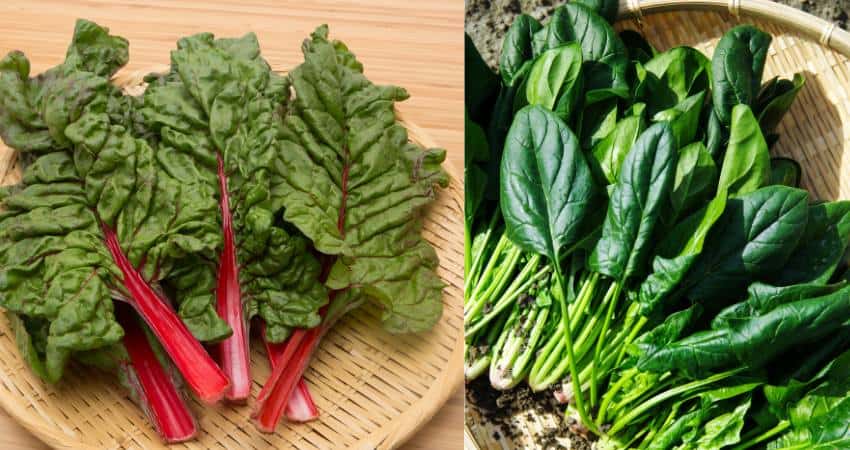
Although some chard or Swiss chard nicknames include the word spinach, they are not the same. It is a distinctly different species to spinach.
Some chard nicknames are:
- Swiss chard spinach
- Silverbeet
- Beet spinach
- Perpetual spinach
- Leaf beet
- Rainbow chard
Typically, spinach grows less vigorously than chard and has smaller leaves. They are both plants with plant seeds.
Nutrition Comparison
The following table compares the nutrients contained per 100 grams.
| Spinach, raw (100 g) | Swiss Chard, raw (100 g) | |
| Calories | 23 | 19 |
| Protein | 2.86 g | 1.80 g |
| Carbohydrates | 3.63 g | 3.74 g |
| Fiber | 2.2 g | 1.6 g |
| Fat | 0.39 g | 0.20 g |
| Sugar | 0.42 g | 1.10 g |
| Vitamin A | 9,380 IU | 6,120 IU |
| Beta-carotene | 5,630 mcg | 3,650 mcg |
| Vitamin C | 28.1 mg | 30.0 mg |
| Vitamin K | 483 mcg | 830 mcg |
| Vitamin D | 0 IU | 0 IU |
| Vitamin B6 | 0.19 mg | 0.10 mg |
| Vitamin B9 (Folate) | 194 mcg | 14 mcg |
| Vitamin B1 (Thiamin) | 0.08 mg | 0.04 mg |
| Vitamin B2 (Riboflavin) | 0.19 mg | 0.09 mg |
| Vitamin B3 (Niacin) | 0.72 mg | 0.40 mg |
| Vitamin B5 (Pantothenic Acid) | 0.07 mg | 0.17 mg |
| Magnesium | 79 mg | 81 mg |
| Phosphorous | 49 mg | 46 mg |
| Potassium | 558 mg | 379 mg |
| Iron | 2.71 mg | 1.80 mg |
| Copper | 0.13 mg | 0.18 mg |
| Calcium | 99 mg | 51 mg |
| Zinc | 0.53 mg | 0.36 mg |
As per the USDA, one cup of spinach is approximately 30 grams.
Both greens are nutrient dense. At first glance it may be difficult to determine which is healthier.
Spinach is healthier than Swiss chard because it provides more protein, fiber, vitamin A, B6, folate, thiamin, riboflavin, niacin, phosphorus, potassium, iron, calcium and zinc.
Chard is healthy also and provides more of the following:
- Vitamin C
- Vitamin K
- B5
- Magnesium
- Copper
I mostly consume spinach due to its better nutrients. If spinach is unavailable I’ll use other leafy greens. It’s good to alternate foods to take advantage of both their benefits.
Find out how each one of these nutrients benefit health in the lower section of this article.
Which to Choose?
Choosing one food or the other may depend on your particular goals. This section will examine the four most popular goals and determine which of the two foods is better for them.
Gluten Free
This goal is an easy one to determine. For people who have celiac disease, whether one food contains gluten will automatically make the decision which to choose.
Some people prefer following a gluten free diet, therefore it’s important also. Let’s answer which one of the two greens is gluten free.
Spinach and Swiss chard are gluten free. Therefore, both foods are good options for a gluten free diet.
Keto Diets or Low-carb
If you’re considering one of these diets or currently consuming low-carb foods, the number of carbs may make a huge difference in your choice. Therefore, let’s examine which one has more carbohydrates.
Chard has 3.74 grams of carbohydrates, and spinach has 3.63 per 100 grams. Spinach provides 3% fewer carbohydrates per 100 grams making it better for low-carb diets.
The difference isn’t large and choosing one over the other may not matter much. Although when limiting the total daily amount, every gram can make a difference.
Weight Loss
The number of calories per serving matters a whole bunch if weight loss is the goal. Let’s examine how many calories per serving each of the greens contain.
Spinach has 23 calories, and Swiss chard has 19 calories per 100 grams. Swiss chard provides 21% less calories making it better for weight loss.
The difference is minimal and choosing one over the other may not make much of a difference. Although when counting calories every little bit may help as the total is calculated for the day.
Bodybuilding
If gaining lean muscle mass is your goal then the amount of protein and carbohydrates may matter to you.
Healthy carbohydrates help to increase performance and fuel energy when exercising or lifting weights. It’s why marathon runners consume many carbs the day and night before the big race.
Any extra protein helps to build and repair muscle after putting them through a good workout. Therefore, let’s take a closer look at which is better for bodybuilding.
Spinach is better than chard for bodybuilding due to its higher percentage of protein. It provides 2.86 grams of protein per 100 grams. This equals 59% more protein per 100 grams.
In addition, it provides a few more calories which may help when trying to bulk up. The carbohydrate number between the two is similar.
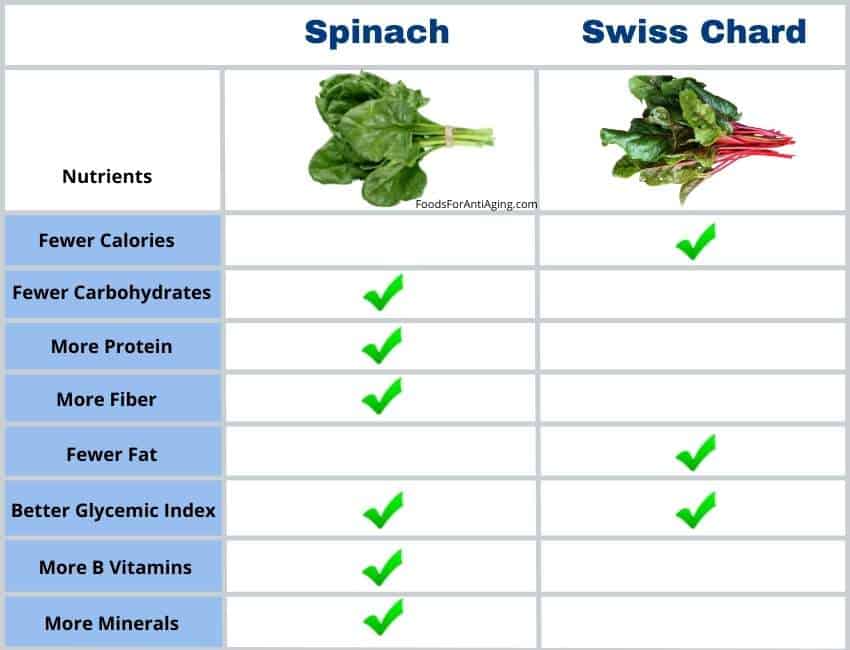
Taste and Texture
Let’s face it, if someone doesn’t like the way a food tastes, they will probably leave it on the store shelf. Therefore, let’s examine how the taste and texture of each one compares.
Swiss chard has a slightly bitter taste when raw compared to the slightly milder spinach. Cooked Swiss chard loses the bitterness and tastes milder and sweeter, similar to spinach. Both of their leaves have a similar texture when raw and both wilt when cooked.
The stem of the chard leaf is crunchy with a sweet flavor.
I wanted to conduct original research and get the opinion of real people like you. So I reached out to some of my clients, readers and members of food groups and asked, which of the two greens taste better,?
- 46% said they preferred the taste of spinach.
- 42% said they preferred the taste of Swiss chard.
- 12% said it depended on their mood.
To conduct more original research, I setup a blind taste test at home. I tried both which were chopped up into similar size leaves to avoid simple detection. I chose the spinach for its better taste.
In the battle of taste, spinach had a slight win in my poll and at home.
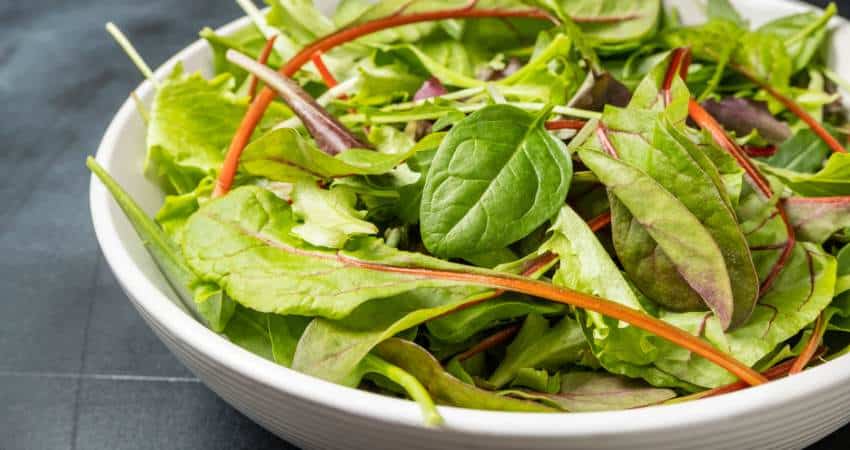
Substituting
Sometimes people want to substitute one for the other due to taste, price or availability. This makes some people wonder if they can substitute one for the other.
Due to their similar tastes and textures, Swiss chard and spinach can substitute for each other in recipes raw or cooked recipes. When substituting, use a one to one ratio for raw or cooked dishes. Depending on how you trim their leaves, chard may involve slightly longer preparation time to trim the stems.
Other recipe substitutions for both of them include the following:
- Romaine
- Bok choy
- Watercress
- Arugula
- Green leaf lettuce
- Butterhead lettuce
- Iceberg lettuce
- Beet greens
- Mustard greens
They both can be used in the following preparations or recipes:
- Salads
- Sandwiches
- Wraps
- Juices
- Smoothies
- Boiling
- Sauteeing
- Steaming
- Blanching
The following video compares spinach and Swiss chard.
The Prices
The price of foods purchased every week is important to most people, especially with inflation the way it is. Let’s take a close look at how much each one costs.
The price for fresh Swiss chard and spinach are similar. The average price for chard is $0.19 per ounce. The average price for spinach is $0.18 per ounce.
To conduct my own original research, I visited some local supermarkets and compared the prices. Here are my findings.
First I checked Walmart:
- Marketside bagged fresh spinach
- 10 ounce bag $1.98. Equals $0.20 per ounce
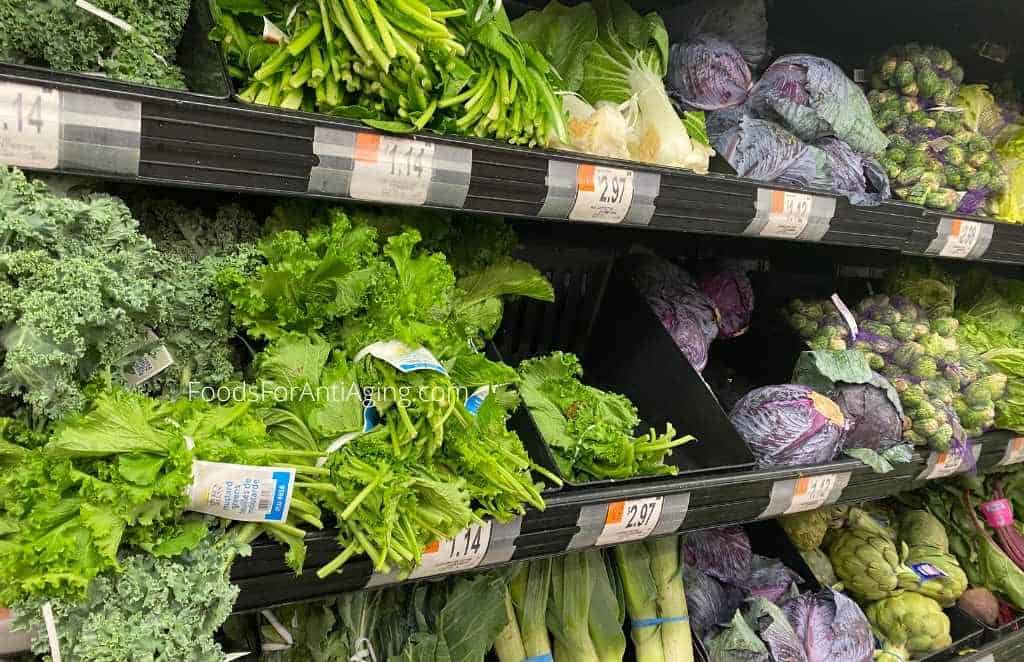
I then checked my local Shoprite supermarket:
- Fresh spinach bundle
- 12 ounces for $1.87. Equals $0.16 per ounce
- Fresh chard bundle
- 16 ounces for $2.99. Equals $0.19 per ounce
I then checked FreshDirect online:
- Fresh chard
- 16 ounces for $2.99. Equals $0.19 per ounce

Glycemic Indexes
The Glycemic Index (GI) is a scale measuring how fast a particular food raises the blood sugar in the blood3. Blood sugar spikes can lead to health complications with the heart, nerves, kidneys and eyes4.
Foods on the GI scale are categorized as:
- Low-GI foods: 55 or under
- Medium-GI foods: 56-69
- High-GI foods: 70 or over
How blood sugars levels are affected:
- Foods with a glycemic index 70 or more cause a quicker spike in blood sugar levels.
- Foods with a glycemic index 56 to 69 cause a moderate spike in blood sugar levels.
- Foods with a glycemic index 55 or less cause a slow spike in blood sugar levels.
Let’s examine which food has a higher glycemic index.
Swiss chard and spinach have low glycemic indexes and are considered low GI foods. Either food is a good choice avoiding many blood sugar spikes.
I compared the benefits of baby spinach and regular in my article. Find out which one had a better Gi.
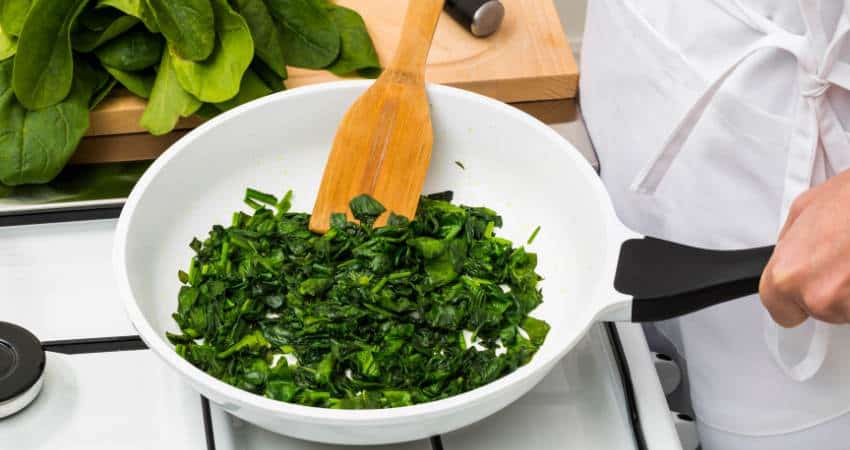
Health Benefits
This section will examine the health benefits of the nutrients provided by both foods. Each section includes the benefits of each nutrient and a breakdown of the numbers and percentages provided by each vegetable.
Swiss Chard Health Benefits
The following video explains the health benefits of Swiss chard.
Vitamin C
- Swiss chard provides 6.7% more vitamin C per 100 grams.
Vitamin C acts as an antioxidant and helps with the following:
- Prevent cell damage.
- May help boost the immune system.
- Collagen production.
- Help heal wounds.
- Increases iron absorption.
- Help maintain health gums.
Vitamin K
- Chard provides 72% more vitamin K per 100 grams.
Vitamin K comes in two forms. Phylloquinone is the one found in both vegetables.
Vitamin K helps to make various proteins needed to help with the following:
- Heart disease
- Blood clotting
- Bone health
Vitamin K, through the production of proteins, help to prevent hardening or calcification of the arteries5.
Magnesium
Magnesium helps the body control the following:
- Nerve function
- Blood pressure
- Muscle function
- Insomnia
- Blood sugar
Magnesium helps keep blood pressure levels stable and balanced. Recent scientific research examined previous studies and concluded magnesium supplementation decreased systolic and diastolic blood pressure6.
Many people supplement with magnesium in the evening because it helps calm the whole body including blood vessels.
Find out if which one had more nutrients in my article, Kale vs Spinach: Which is Better? A Complete Comparison.
Spinach Health Benefits
Calcium
- Spinach is much higher in calcium. It provides 94% more calcium per 100 grams.
Calcium helps the following:
- Helps nerve function.
- Help the muscles to function properly.
- Build and maintain strong bones.
In addition, calcium is important for the heart and blood pressure. Harvard Health reports calcium helps maintain blood pressure by helping in the controlling of the relaxing and tightening of blood vessels7.
Potassium
- Spinach provides 47% more potassium per 100 grams.
According to Harvard Health, a number of studies have shown a connection between low potassium levels and high blood pressure8. The more potassium, the more sodium your body will lose.
Iron
- Spinach provides 50% more iron per 100 grams.
Iron is a necessary part of any healthy diet9 and may help with the following:
- Vital for development and growth.
- Is essential the creation of red blood cells.
- Help some hormones remain balanced.
- Help the immune system.
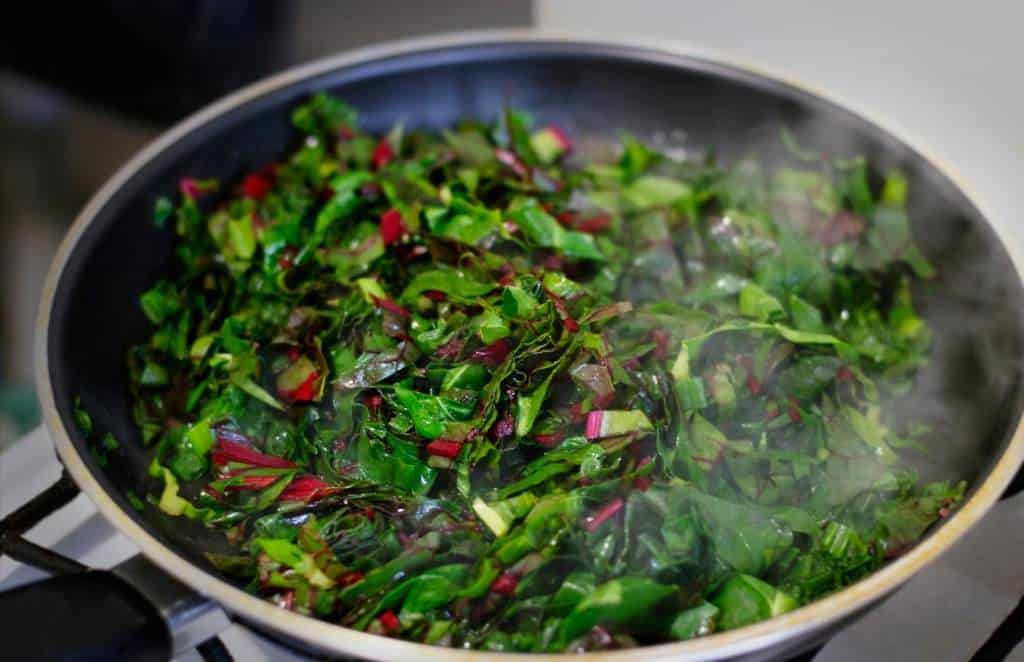
Vitamin A & Beta Carotene
Both vegetables provide a good amount.
- Spinach provides 53% more vitamin A and 54% more beta carotene per 100 grams.
Beta-carotene is a compound present in both foods. The body converts beta-carotene into vitamin A.
According to scientific studies, vitamin A helps the eyes when it comes to dim light vision and dry eyes ((National Center for Biotechnology Information: Nutrients for the aging eye)).
Besides eye health, an increased number of vitamin A has been shown to fight and prevent cardiovascular disease, which is the leading cause of death in the United States10.
In addition, vitamin A is a powerful antioxidant that can help reduce cellular damage by controlling the negative effects of free radicals11.
Another health benefit of spinach is an electrolyte replacement. Find out more in my article, 17 Best Gatorade Substitutes.
In the following video an accredited hospital and doctor explain the health benefits of spinach.
B Vitamins
Spinach provides a higher percentage of B6, folate, thiamin, niacin and riboflavin.
The B vitamins provided include the following:
- B1 (thiamin)
- B2 (riboflavin)
- B3 (niacin)
- B5
- B6
- B9 (folate)
B vitamins help support the following:
- Brain function.
- Digestion.
- Nerve function.
- Cardiovascular disease.
- Red blood cells.
- Energy levels.
Collard Greens
Find out if collard greens are better in my article, Collard Greens vs Spinach: Which is Better? A Comparison.
If you have any questions about this article don’t hesitate to email us. You can find an email on our contact page.
Read More Spinach Food vs Food Articles
Spinach vs Romaine: Which is Better? An Ultimate Comparison
Spinach vs Broccoli: Which is Better? A Complete Comparison
Frozen Spinach vs Fresh: Which is Better? A Comparison
Raw Spinach vs Cooked Spinach: Which is Better? A Comparison
Arugula vs Spinach: Which is Better? A Complete Comparison
Organic Spinach vs. Regular Spinach: What’s The Difference?
Spinach vs Lettuce: Which is Better? A Complete Comparison
- USDA: Spinach, raw [↩]
- USDA: Chard, Swiss, raw [↩]
- Harvard Health Publishing: Glycemic index for 60+ foods [↩]
- National Institute of Diabetes and Digestive and Kidney Diseases: Know Your Blood Sugar Numbers: Use Them to Manage Your Diabetes [↩]
- Harvard T.H. Chan: Vitamin K [↩]
- National Center for Biotechnology Information: Effect of magnesium supplementation on blood pressure: a meta-analysis [↩]
- Harvard Health: Key minerals to help control blood pressure [↩]
- Harvard Health: Potassium lowers blood pressure [↩]
- National Institutes of Health: Iron [↩]
- National Center for Biotechnology Information: Antioxidant potentials of vitamin A and carotenoids and their relevance to heart disease [↩]
- National Center for Biotechnology Information: Free radicals, antioxidants and functional foods: Impact on human health [↩]
